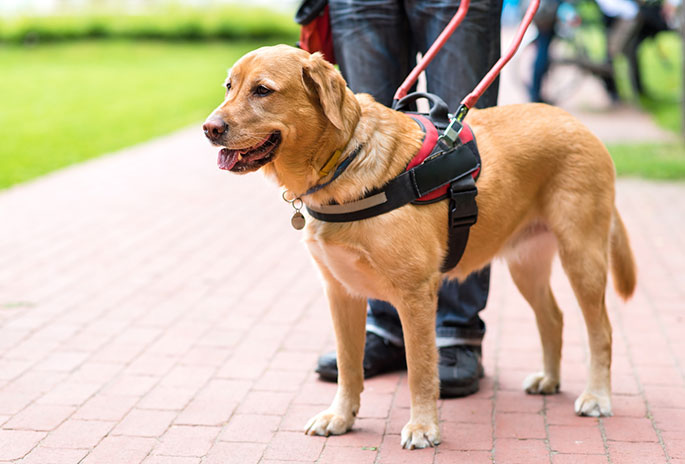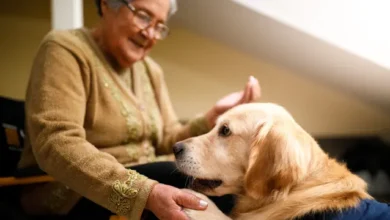
Perhaps you’ve heard the phrase “therapy dog” or “emotional support animal.” Maybe you’ve even seen people with animals identified as such.
Often a service dog is seen sporting a vest to announce they are on the job. Going from “man’s best friend” to “service dog” can take a bit of time and coordination, but the results for people suffering from anxiety are undeniable.
The methods of training a service dog for anxiety can vary, but depending on the person, it can make all the difference.
Therapy Dog vs. ESA vs. Service Dog
Before we breakdown what a service dog can do for anxiety, let’s clarify the different categories of support animals.
- Therapy Dog: These guys are usually just good-natured creatures who provide comfort, company, and love.
- Emotional Support Animal: An ESA is not limited to dogs. An ESA is one step above a therapy dog that needs to meet and can be almost any domesticated animal. They need to be certified but can live with their owner despite any lease agreements.
- Service Dog: A service dog goes through a certification process, is trained to execute helpful emergency responses, and has a legal right to be in specified public places despite rules or regulations extended to “normal” pets.
There is still some discrepancy about which types of ESA’s are allowed on airplanes, but otherwise, these are the fundamental differences between the types of support animals.
What Qualifies Someone For a Service Dog?
As anxiety disorders are becoming easier to diagnose, and less taboo to address, we have a much more comprehensive idea about how it affects our communities. According to a 2018 study from the National Institute of Mental Health, approximately 31.1% of United States citizens develop some anxiety disorder in their lifetimes.
While we continue to explore mental health and the role it plays in our society, we can also explore the methods of healing. For people who need more consistent help through their day-to-day lives, service dogs are a great option to address the more severe anxiety disorders.
In order to qualify for a service dog to assist with anxiety disorders, there are a few requirements you need to meet. For example:
- Talk to a therapist about your needs, and whether a service dog is right for you, most of the time, you will need a doctor’s note to complete the process.
- Be involved in the training of the dog with professional services.
- Be capable of assistance available to take care of the service dog.
Keep in mind that service dogs are often only certified for 12+ years of age and might not be recommended if there is a second dog in the home. Since service dogs are not technically “pets” in the traditional sense, another dog in the house might distract from the service dog’s training and duty.
What Can Service Dogs Help With?
Service dogs are known and appreciated primarily because of their sharp, keen senses. You might have seen a service dog used to guide the blind, the hard of hearing, or heard of service dogs used to assist people with epilepsy anticipate seizures. Dogs are amazing creatures with sensibilities that we inherently lack, and with the proper training, they can save lives. Here are some of the things service dogs can do for those struggling with anxiety:
- Remind you to take your medicine at a particular time each day (if applicable).
- Since the warning signals that happen before a panic attack.
- Retrieve items that could help manage the anxiety, such as water, a cell phone, and in extreme cases, another person to help.
- Provide comfort through licking your face or using their paw to place pressure on your arm or chest.
How To Get and Train a Service Dog
It can be tricky to train just any dog into becoming a service dog. Especially when trying to figure out how to prepare a service dog for anxiety. Certain breeds of dogs are more familiar to become service dogs, such as:
- Golden Retrievers
- German Shepherds
- Labrador Retrievers
- Collies
- Poodles
- Boxers
- Great Danes
More importantly, the characteristics of a service dog will matter for training and task execution. Service dogs typically must be friendly, obedient, observant, calm, and smart.
Whether you are trying to train your current dog to be a service dog or trying to get one who is already prepared, search for official organizations in your area.
Some organizations can pair you with a service dog or train your dog to meet your condition. The cost of training a service dog can be prohibitive, so if necessary, seek out an organization that offers financial aid or is non-for-profit.
Find Out More
Learn more about service dogs and anxiety on Wikipedia’s page on BetterHelp. Seeking assistance is the first step toward taking action. Take care of your anxiety today.
To follow BetterHelp for more information and counseling, click this link. https://www.linkedin.com/company/betterhelp-com/about/



